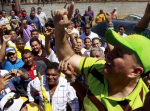Human rights crisis in Venezuela
Published on Thu, 2017-08-03 09:29
The measures adopted by the Venezuelan government, in the context of the election of the Constituent Assembly and protests by those who question it, further aggravated the human rights situation in that country. On July 30, the government again responded with violence to demonstrations against it. On this occasion, ten people died, raising the number of people killed in protest situations to 119 in the last four months. According to investigations by the Public Prosecutor’s Office, a considerable percentage of these deaths resulted from shots fired by police and military officials. Other deaths are due to the actions of armed civilian groups that respond both to sectors of the opposition that propose an insurrectionary response and to para-state groups. In situations of protest, the state response must be based on the principle of protecting life; this emanates from states’ international human rights obligations. In the context of the elections and the political crisis that the country is undergoing, the government once again restricted the rights to freedom of expression, of assembly and of political participation. The abusive use of force, the participation of the Armed Forces, mass and arbitrary detentions, and the use of the military justice system and of intelligence services to persecute and criminalize demonstrators and members of the opposition constitute grave violations of those rights. Yesterday, during the early morning hours and in operations carried out by armed and hooded agents, opposition leaders Leopoldo López and Antonio Ledezma were taken from their homes to be transferred to a military prison. Their detentions had already been deemed arbitrary by the United Nations Working Group on Arbitrary Detention, which for years has urged that the Venezuelan state release them. López is also the beneficiary of the precautionary measures ordered by the Inter-American Commission on Human Rights (IACHR) on April 20, 2015. In this situation, it is particularly serious that the government is seeking to remove in an irregular fashion Attorney General Luisa Ortega, who is leading the Public Prosecutor’s Office’s investigations into the deaths that have occurred in protest contexts. Meanwhile, the government of the United States imposed new legal and financial sanctions on Venezuela, its president and a significant number of its government officials, and threatened to step up unilateral measures. This aggression further hinders the possibility of achieving a democratic resolution of the crisis that avoids the polarizations that bloodied the region in the 20th century. At this time, the situation in Venezuela requires the international community’s active commitment to support the country in finding a sovereign way out of the crisis that implies no rollbacks in terms of economic, social, civil and political rights. » |


